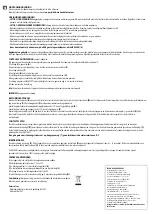
© National Instruments
|
4-11
Using a Digital Source
To use DO Start Trigger, specify a source and a rising or falling edge. The source can be one of
the following signals:
•
A pulse initiated by host software
•
Any PFI terminal
•
AI Reference Trigger
•
AI Start Trigger
The source also can be one of several internal signals on the cDAQ chassis. Refer to the
Device
Routing in MAX
topic in the
NI-DAQmx Help
or the
LabVIEW Help
for more information.
You also can specify whether the waveform generation begins on the rising edge or falling edge
of DO Start Trigger.
Using an Analog Source
Some C Series I/O modules can generate a trigger based on an analog signal. In NI-DAQmx, this
is called the Analog Comparison Event, depending on the trigger properties.
When you use an analog trigger source, the waveform generation begins on the first rising or
falling edge of the Analog Comparison Event signal, depending on the trigger properties. The
analog trigger circuit must be configured by a simultaneously running analog input task.
Note
Depending on the C Series I/O module capabilities, you may need two
modules to utilize analog triggering.
Routing DO Start Trigger Signal to an Output Terminal
You can route DO Start Trigger to any output PFI terminal. The output is an active high pulse.
DO Pause Trigger Signal
Use the DO Pause Trigger signal (do/PauseTrigger) to mask off samples in a DAQ sequence.
When DO Pause Trigger is active, no samples occur, but DO Pause Trigger does not stop a
sample that is in progress. The pause does not take effect until the beginning of the next sample.
When you generate digital output signals, the generation pauses as soon as the pause trigger is
asserted. If the source of the sample clock is the onboard clock, the generation resumes as soon
as the pause trigger is deasserted, as shown in Figure 4-5.
Figure 4-5.
DO Pause Trigger with the Onboard Clock Source
Pause Trigger
Sample Clock
















































